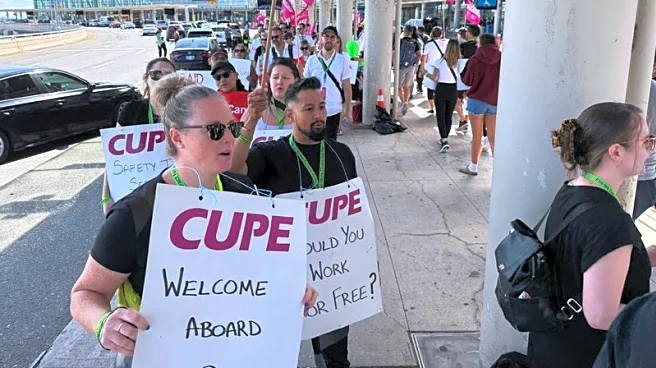By Allison Lampert and Rajesh Kumar Singh
MONTREAL/CHICAGO (Reuters) -Results of a vote by Air Canada flight attendants on a wage agreement are expected on Saturday, with more than a half dozen crew members telling Reuters they don't expect the tentative deal to get approved.
Negotiators said they struck the tentative deal on August 19 to end a crippling four-day strike, after more than 10,000 flight attendants defied government efforts to return them to work and forced the country's largest carrier
back to the bargaining table.
If attendants reject the wage portion of the tentative agreement, the only section subject to the vote, they could not take further legal strike action. The matter would instead go to arbitration, prolonging talks in a dispute that caused Air Canada to withdraw financial guidance for 2025.
The result of the vote will not be known until after 3 p.m. (1900 GMT) on Saturday, the union added.
The strike cast a spotlight on demands by North American flight attendants to be paid for hours from the time they check in to when they clock out. Flight attendants at Air Canada and at multiple U.S. carriers such as United Airlines have been challenging a compensation structure that mostly pays cabin crew when an aircraft is in motion.
Sara Nelson, International President of the Association of Flight Attendants, told Reuters that public support for the Air Canada strike also helps her U.S. members. The AFA represents United's flight attendants, who recently rejected a tentative agreement partly over demands for ground pay.
"The inspirational fight of the Air Canada flight attendants is helpful and creates momentum," Nelson said.
DISAPPOINTMENT OVER DEAL
While the flight attendants managed to secure some critical gains in Air Canada's proposed contract, several told Reuters that the overall deal fell short on the issue of unpaid labor, and some said they would vote against it.
The proposed four-year deal would add up to roughly a 20% wage hike for entry-level attendants and 16% for more experienced cabin crew.
Crew would also receive 60 minutes of pre-flight pay on narrowbody planes and 70 minutes on widebody jets, with pay starting at 50% of flight attendants' hourly rate in year one, rising to 70% by year four.
Flight attendants told Reuters that the raises do not cover their increased cost of living, particularly in high-cost cities such as Toronto, with many doing two or three jobs to get by.
The deal was struck between Air Canada and the union with a mediator at a Toronto airport hotel, under the threat of criminal charges, Canadian Union of Public Employees President Mark Hancock said.
"My understanding was the next day, if there was no deal, they would have gone to the courts and sought criminal contempt, then charges and fines," Hancock told Reuters. "It would have risen to the next level."
(Reporting By Allison Lampert in Montreal and Rajesh Kumar Singh in Chicago; Editing by Edmund Klamann)
















